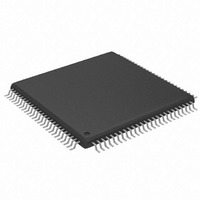PIC32MX575F256LT-80I/PT Microchip Technology, PIC32MX575F256LT-80I/PT Datasheet - Page 2

PIC32MX575F256LT-80I/PT
Manufacturer Part Number
PIC32MX575F256LT-80I/PT
Description
256KB Flash, 64KB RAM, 80 MHz, USB, 1xCAN, 8 DMA 100 TQFP 12x12x1mm T/R
Manufacturer
Microchip Technology
Series
PIC® 32MXr
Datasheets
1.PIC32MX320F032H-40IPT.pdf
(66 pages)
2.PIC32MX575F256H-80IMR.pdf
(2 pages)
3.PIC32MX575F256H-80IMR.pdf
(254 pages)
4.PIC32MX575F256H-80IMR.pdf
(14 pages)
Specifications of PIC32MX575F256LT-80I/PT
Core Processor
MIPS32® M4K™
Core Size
32-Bit
Speed
80MHz
Connectivity
CAN, I²C, SPI, UART/USART, USB OTG
Peripherals
Brown-out Detect/Reset, DMA, POR, PWM, WDT
Number Of I /o
85
Program Memory Size
256KB (256K x 8)
Program Memory Type
FLASH
Ram Size
64K x 8
Voltage - Supply (vcc/vdd)
2.3 V ~ 3.6 V
Data Converters
A/D 16x10b
Oscillator Type
Internal
Operating Temperature
-40°C ~ 85°C
Package / Case
100-TFQFP
Lead Free Status / RoHS Status
Lead free / RoHS Compliant
Eeprom Size
-
Lead Free Status / RoHS Status
Lead free / RoHS Compliant
Available stocks
Company
Part Number
Manufacturer
Quantity
Price
Company:
Part Number:
PIC32MX575F256LT-80I/PT
Manufacturer:
Microchip Technology
Quantity:
10 000
PIC32MX
3.0
All tool programmers must perform a common set of
steps, regardless of the actual method being used.
Figure 3-1 shows the set of steps to program PIC32MX
devices.
FIGURE 3-1:
DS61145G-page 2
PROGRAMMING STEPS
(Only required for 2-wire)
Exit Programming Mode
Enter Enhanced ICSP™
Enter Serial Exec Mode
Download a Data Block
No
Check Device Status
Initiate Flash Write
Download the PE
PROGRAMMING FLOW
Erase Device
Verify Device
(Optional)
Done
Done
Start
Yes
The following sequence lists the steps, with a brief
explanation of each step. More detailed information
about the steps is available in the following sections.
1.
2.
3.
4.
5.
6.
7.
Note:
Note:
Connect to the Target Device.
To ensure successful programming, all required
pins must be connected to appropriate signals.
See 4.0 “Connecting to the Device” in this
document for more information.
Place the Target Device in Programming Mode.
For 2-wire programming methods, the target
device must be placed in a special programming
mode (Enhanced ICSP™) before executing any
other steps.
See 7.0 “Entering Programming Mode” for
more information.
Check the Status of the Device.
Step 3 checks the status of the device to ensure
it is ready to receive information from the
programmer.
See 8.0 “Check Device Status” for more
information.
Erase the Target Device.
If the target memory block in the device is not
blank, or if the device is code-protected, an
erase
programming any new data.
See 9.0 “Erasing the Device” for more
information.
Enter Programming Mode.
Step 5 verifies that the device is not code-
protected and boots the TAP controller to start
sending and receiving data to and from the
PIC32MX CPU.
See 10.0 “Entering Serial Execution Mode”
for more information.
Download the Programming Executive (PE).
The PE is a small block of executable code that
is downloaded into the RAM of the target device.
It will receive and program the actual data.
See 11.0 “Downloading the Programming
Executive (PE)” for more information.
Download the Block of Data to Program.
All methods, with or without the PE, must down-
load the desired programming data into a block
of memory in RAM.
See 12.0 “Downloading a Data Block” for
more information.
For the 4-wire programming methods,
Step 2 is not required.
If the programming method being used
does not require the PE, Step 6 is not
required.
step
must
© 2010 Microchip Technology Inc.
be
performed
before












